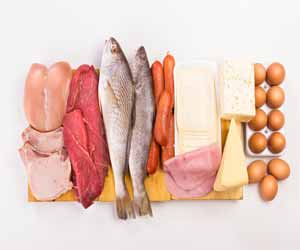- Home
- Editorial
- News
- Practice Guidelines
- Anesthesiology Guidelines
- Cancer Guidelines
- Cardiac Sciences Guidelines
- Critical Care Guidelines
- Dentistry Guidelines
- Dermatology Guidelines
- Diabetes and Endo Guidelines
- Diagnostics Guidelines
- ENT Guidelines
- Featured Practice Guidelines
- Gastroenterology Guidelines
- Geriatrics Guidelines
- Medicine Guidelines
- Nephrology Guidelines
- Neurosciences Guidelines
- Obs and Gynae Guidelines
- Ophthalmology Guidelines
- Orthopaedics Guidelines
- Paediatrics Guidelines
- Psychiatry Guidelines
- Pulmonology Guidelines
- Radiology Guidelines
- Surgery Guidelines
- Urology Guidelines
High intake of animal based protein can cause kidney stones

China: Higher intake of animal protein in the diet can cause kidney stones -- is the conclusion of a recent study.
According to the study, published in the Journal of Urology, greater animal protein intake is associated with the risk of kidney stone. Increasing the proportion of plant protein relative to animal protein appears to provide protection against the risk.
Some sources of animal protein include fish, eggs, dairy products (cheese, milk and whey), red meat, and poultry.
High dietary intake of animal fat is a known risk factor for nephrolithiasis (kidney stone). But whether plant-based protein sources are associated with the risk of kidney stone is not well studied.
Ryan S. Hsi, Vanderbilt University Medical Center, Nashville, Tennessee, and colleagues examined the association of animal and plant protein intakes and risk of incident kidney stones in Shanghai, China.
The study involved 69,166 women in the Shanghai Women’s Health Study (SWHS) and 58,054 men in the Shanghai Men’s Health Study (SMHS). A validated food frequency questionnaire was filed by all the participants. After a follow-up of 8 years, kidney stones were reported in 1,451 men and 1,202 women.
The lowest quintile of animal protein consumption was a mean intake of less than 19.3 g/day for women and less than 17.2 g/day for men; the highest quintile was a mean intake of 36.8 g/day or higher for women and 36.2 g/day for men. The lowest quintile of non-dairy animal protein consumption was a mean intake of less than 17.4 g/day for women and less than 14.9 g/day for men; the highest quintile was a mean intake of 33.5 g/day or higher for women and 32.7 g/day or higher for men.
Also Read: Plant proteins safer than meat proteins for heart patients, finds study
Key findings include:
- The average intakes of animal and plant protein were 31.3 g/day and 48.4 g/day for women, respectively, and 30.8 g/day and 51.3 g/day for men, respectively.
- After adjusting for multiple variables individuals in the highest quintile of total animal protein intake (dairy and non-dairy) and non-dairy animal protein intake had a significant 16% and 14% increased risk of kidney stone development, respectively, compared with those in the lowest quintile.
- Participants in the highest quintile of the animal to plant protein ratio and non-dairy animal to plant protein ratio had a significant 17% and 20% increased risk of kidney stone formation, respectively.
- No association was found between kidney stone risk and total protein consumption or either dairy protein or plant protein consumption.
Also Read: Choose Proteins wisely for health of Heart- AHA
"Among this population of relatively low animal protein and high plant protein intakes, greater animal protein intake is associated with kidney stone risk. Increasing the proportion of plant protein relative to animal protein appears protective against the risk," concluded the authors.

Disclaimer: This site is primarily intended for healthcare professionals. Any content/information on this website does not replace the advice of medical and/or health professionals and should not be construed as medical/diagnostic advice/endorsement or prescription. Use of this site is subject to our terms of use, privacy policy, advertisement policy. © 2020 Minerva Medical Treatment Pvt Ltd